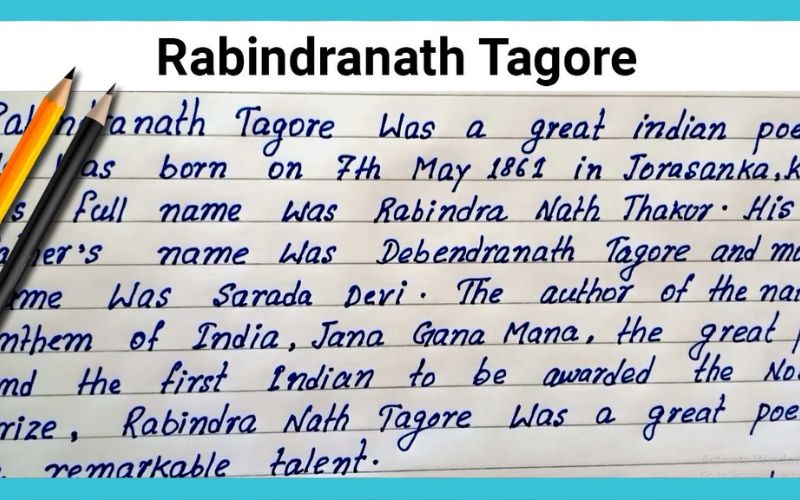Rabindranath Tagore was a renowned Bengali polymath who made invaluable contributions to Indian literature, art, and philosophy. Born in 1861 in Calcutta (now Kolkata), Tagore’s life and work have had a lasting impact on the world stage, earning him the prestigious Nobel Prize in Literature in 1913. As a writer, poet, musician, painter, and social reformer, Tagore’s versatility and genius have cemented his place as one of the most celebrated figures in the history of India and beyond.
In this comprehensive essay, we will delve into the captivating life and remarkable legacy of Rabindranath Tagore, exploring his early life, literary career, philosophical insights, and enduring influence on the world.
Early Life and Education of Rabindranath Tagore
Rabindranath Tagore was born into a prominent and influential family in Calcutta, the youngest of 13 children. His father, Debendranath Tagore, was a renowned philosopher and religious reformer, while his mother, Sarada Devi, was a deeply spiritual woman who instilled in him a profound appreciation for the arts and culture.
Tagore’s early education was unconventional, as he was largely self-taught and received minimal formal schooling. However, he was exposed to a rich intellectual and cultural environment within his family, which nurtured his innate talents and curiosity. At a young age, Tagore demonstrated a keen interest in literature, poetry, and music, and he began writing and composing at a prodigious pace.
Despite his family’s wealth and social status, Tagore was not immune to the challenges and inequalities of his time. He was deeply affected by the colonial rule in India and the oppression of the Indian people, which would later shape his political and social activism.
Literary Career of Rabindranath Tagore
Tagore’s literary career spanned several decades and encompassed a diverse range of genres, including poetry, novels, short stories, plays, and essays. His first major work, a collection of poems titled “Manasi,” was published in 1890, and it immediately established him as a leading voice in Bengali literature.
Over the course of his career, Tagore produced an extensive body of work, including acclaimed masterpieces such as “Gitanjali,” “The Home and the World,” and “Chokher Bali.” His poetry, known for its lyrical beauty and profound spiritual insights, earned him global recognition and the Nobel Prize in Literature in 1913, the first non-European to receive the prestigious award.
Tagore’s literary contributions extended beyond the written word, as he was also a talented composer and musician. He composed over 2,000 songs, which are now collectively known as “Rabindra Sangeet” and are an integral part of Bengali cultural heritage.
Tagore’s Contribution to Indian Literature and Culture
Rabindranath Tagore’s impact on Indian literature and culture cannot be overstated. He was a trailblazer who pushed the boundaries of traditional forms and introduced new literary styles and themes that resonated with audiences both in India and around the world.
Tagore’s works often explored themes of nationalism, spirituality, social justice, and the human condition, reflecting his deep engagement with the pressing issues of his time. His writings challenged the status quo and advocated for progressive social reforms, particularly in the areas of education and gender equality.
Beyond his literary contributions, Tagore also made significant contributions to the arts, founding the renowned Visva-Bharati University, which became a hub for the study and promotion of Indian culture, art, and philosophy. He was also a skilled painter, and his vibrant and imaginative artworks have been widely celebrated and exhibited globally.
Tagore’s Political and Social Activism
Rabindranath Tagore was not only a literary genius but also a passionate advocate for social and political reform. He was deeply critical of the colonial rule in India and the oppression of the Indian people, and he used his platform to voice his dissent and call for independence.
Tagore’s political and social activism was rooted in his belief in the inherent dignity and worth of all human beings. He championed the rights of the marginalized and underprivileged, and he worked tirelessly to promote education, healthcare, and economic development in rural communities.
One of Tagore’s most notable acts of political defiance was his decision to renounce the knighthood he had received from the British government in 1915, in protest of the Jallianwala Bagh massacre, where British troops opened fire on a peaceful gathering of unarmed civilians. This bold gesture cemented Tagore’s reputation as a fearless and principled leader in the Indian independence movement.
Tagore’s Philosophy and Worldview
Rabindranath Tagore’s philosophical and spiritual beliefs were deeply rooted in the rich traditions of Hinduism and Indian spirituality. He believed in the interconnectedness of all beings and the inherent divinity within every individual.
Tagore’s worldview was characterized by a deep reverence for nature, a belief in the power of love and compassion, and a rejection of rigid dogma and hierarchy. He championed the idea of a universal human community, where people from diverse backgrounds could come together in harmony and mutual understanding.
Tagore’s philosophical writings, such as “Sadhana” and “Personality,” explored themes of spirituality, education, and the human condition, and they continue to inspire and influence thinkers and scholars worldwide.
Tagore’s Impact on the World Stage
Rabindranath Tagore’s influence extended far beyond the borders of India, as he gained international recognition and acclaim for his literary and artistic achievements. His works were translated into numerous languages, and he became a cultural ambassador, sharing the rich tapestry of Indian art, music, and philosophy with audiences around the world.
Tagore’s global impact was further cemented by his extensive travels and interactions with prominent figures in the West, such as Albert Einstein, Romain Rolland, and W.B. Yeats. These exchanges fostered a deeper understanding and appreciation of Indian culture and thought, and they helped to bridge the gap between the East and the West.
Tagore’s universal message of peace, unity, and human dignity resonated with people across the globe, and his legacy continues to inspire and influence thinkers, artists, and activists to this day.
Awards and Recognition Received by Rabindranath Tagore
Rabindranath Tagore’s remarkable contributions to literature, art, and social reform were widely recognized during his lifetime and continue to be celebrated today. Some of the most prestigious awards and honors he received include:
- Nobel Prize in Literature (1913) – Tagore was the first non-European to be awarded the Nobel Prize in Literature, honoring his “profoundly sensitive, fresh and beautiful verse, by which, with consummate skill, he has made his poetic thought, expressed in his own English words, a part of the literature of the West.”
- Knighthood (1915) – Tagore was awarded the knighthood by the British government, which he later renounced in protest of the Jallianwala Bagh massacre.
- Bharat Ratna (1961) – India’s highest civilian honor, awarded posthumously to Tagore in recognition of his unparalleled contributions to the nation’s cultural heritage.
- Desikottama (1935) – The highest honor bestowed by Visva-Bharati University, which Tagore himself founded.
- Sahitya Akademi Award (1941) – Tagore was the first recipient of this prestigious award for Indian literature, honoring his novel “Gora.”
These accolades, along with countless other awards and recognitions, stand as a testament to Rabindranath Tagore’s enduring legacy and his lasting impact on the world.
Legacy and Influence of Rabindranath Tagore
Rabindranath Tagore’s legacy as a towering figure in Indian and world literature, art, and philosophy is truly remarkable. His works continue to be studied, celebrated, and reinterpreted by scholars, artists, and audiences across the globe, and his influence can be seen in the works of countless writers, thinkers, and activists who have been inspired by his visionary ideas.
Tagore’s impact on the world stage extends far beyond his literary and artistic achievements. He was a tireless advocate for social justice, educational reform, and the promotion of intercultural understanding, and his ideas and philosophies have continued to shape the discourse on these critical issues.
Today, Tagore’s name is synonymous with the rich cultural heritage of India, and his contributions to the nation’s intellectual and artistic landscape are celebrated with reverence and pride. From the iconic Rabindra Sangeet songs that permeate Bengali culture to the Visva-Bharati University that he founded, Tagore’s enduring legacy continues to inspire and influence people around the world.
Conclusion
Rabindranath Tagore’s life and work stand as a testament to the power of the human spirit and the transformative potential of art, literature, and philosophy. Through his diverse and prolific body of work, Tagore left an indelible mark on the world, inspiring generations of readers, thinkers, and artists to embrace the universal values of love, compassion, and human dignity.
As we reflect on Tagore’s enduring legacy, we are reminded of the timeless wisdom and profound insights that continue to resonate with people across cultures and generations. His visionary ideas and unwavering commitment to social justice and cultural exchange have cemented his place as one of the most revered and influential figures in the history of India and the world.
If you’re captivated by the life and legacy of Rabindranath Tagore, we invite you to explore his vast body of work and discover the timeless wisdom and beauty that permeate his writings. Whether you’re a student, a scholar, or simply a lover of literature and culture, Tagore’s enduring legacy has much to offer. Take the time to delve into his poetic masterpieces, his insightful philosophical treatises, and his visionary contributions to the arts and education – and let his words and ideas inspire you to embrace the universal values of love, compassion, and human dignity.



